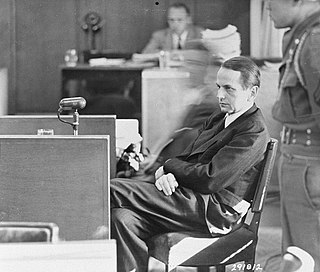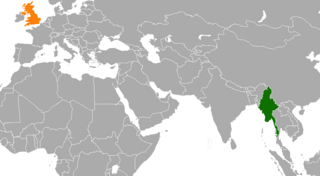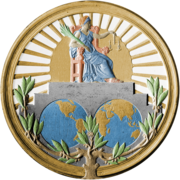
DawAung San Suu Kyi, sometimes abbreviated to Suu Kyi, is a Burmese politician, diplomat, author, and a 1991 Nobel Peace Prize laureate who served as State Counsellor of Myanmar and Minister of Foreign Affairs from 2016 to 2021. She has served as the general secretary of the National League for Democracy (NLD) since the party's founding in 1988 and was registered as its chairperson while it was a legal party from 2011 to 2023. She played a vital role in Myanmar's transition from military junta to partial democracy in the 2010s.
The Convention on the Prevention and Punishment of the Crime of Genocide (CPPCG), or the Genocide Convention, is an international treaty that criminalizes genocide and obligates state parties to pursue the enforcement of its prohibition. It was the first legal instrument to codify genocide as a crime, and the first human rights treaty unanimously adopted by the United Nations General Assembly, on 9 December 1948, during the third session of the United Nations General Assembly. The Convention entered into force on 12 January 1951 and has 152 state parties as of 2022.
In legal terminology, erga omnes rights or obligations are owed toward all. Erga omnes is a Latin phrase which means "towards all" or "towards everyone". For instance, a property right is an erga omnes entitlement and therefore enforceable against anybody infringing that right.

The Rohingya people are a stateless Indo-Aryan ethnic group who predominantly follow Islam and reside in Rakhine State, Myanmar. Before the Rohingya genocide in 2017, when over 740,000 fled to Bangladesh, an estimated 1.4 million Rohingya lived in Myanmar. Described by journalists and news outlets as one of the most persecuted minorities in the world, the Rohingya are denied citizenship under the 1982 Myanmar nationality law. There are also restrictions on their freedom of movement, access to state education and civil service jobs. The legal conditions faced by the Rohingya in Myanmar have been compared to apartheid by some academics, analysts and political figures, including Nobel laureate Bishop Desmond Tutu, a South African anti-apartheid activist. The most recent mass displacement of Rohingya in 2017 led the International Criminal Court to investigate crimes against humanity, and the International Court of Justice to investigate genocide.
There is a history of persecution of Muslims in Myanmar that continues to the present day. Myanmar is a Buddhist majority country, with significant Christian and Muslim minorities. While Muslims served in the government of Prime Minister U Nu (1948–63), the situation changed with the 1962 Burmese coup d'état. While a few continued to serve, most Christians and Muslims were excluded from positions in the government and army. In 1982, the government introduced regulations that denied citizenship to anyone who could not prove Burmese ancestry from before 1823. This disenfranchised many Muslims in Myanmar, even though they had lived in Myanmar for several generations.
A provisional measure of protection is the term that the International Court of Justice uses to describe a procedure "roughly equivalent" to an interim order in national legal systems. The order has also been termed in the press as preliminary measures. The carrying out of the procedure is termed indicating the provisional measure of protection. Requests for the indication of provisional measures of protection take priority over all other cases before the ICJ due to their urgency.

The Rohingya genocide is a series of ongoing persecutions and killings of the Muslim Rohingya people by the military of Myanmar. The genocide has consisted of two phases to date: the first was a military crackdown that occurred from October 2016 to January 2017, and the second has been occurring since August 2017. The crisis forced over a million Rohingya to flee to other countries. Most fled to Bangladesh, resulting in the creation of the world's largest refugee camp, while others escaped to India, Thailand, Malaysia, and other parts of South and Southeast Asia, where they continue to face persecution. Many other countries consider these events ethnic cleansing.
The Advisory Commission on Rakhine State was an international advisory commission headed by former UN Secretary-General Kofi Annan to ensure the social & economical well-being of both the Buddhist and the Rohingya communities of Myanmar's conflict-ravaged Rakhine State. The decision to establish the commission was made on 23 August 2016. The commission was an institution of Myanmar, established in cooperation with the Kofi Annan Foundation, and most members were Myanmar citizens. It became widely known and referred to as the "Annan commission" or the "Rakhine commission."

The Rohingya genocide is a term applied to the persecution—including mass killings, mass rapes, village-burnings, deprivations, ethnic cleansing, and internments—of the Rohingya people of western Myanmar.
Maung Maung Soe is a Burmese military officer who is a major general in the Myanmar Army.
Truth and reconciliation in Myanmar refers to the examination of human rights abuses in Myanmar, particularly involving those suffered by the Rohingya people. From a coup d’état in 1962 to a general election in 2010, Myanmar was controlled by a military regime. The junta was officially dissolved in 2011 into a civilian government, but there are lasting effects from the decades of military rule. Currently, the income gap in Myanmar is one of the largest in the world, and there are claims that many members of the previous regime continue to hold positions of power. In 2012, U.N. Special Rapporteur Tomas Ojea Quintana called on the creation of a truth commission by Myanmar to look into the human rights abuses committed by the previous government's rule. Quintana also called for an "independent and credible investigation" into the conflict between the Rakhine Buddhists and the Rohingya Muslim minority. In 2015, the Network for Human Rights Documentation Burma (ND-Burma) came out with a report that called for the acknowledgement and reparation for both crimes committed under the military junta, and the abuses currently ongoing.
Events of 2019 in Myanmar xxx
The Special Envoy of the Secretary-General on Myanmar is a special Representative of the Secretary-General of the United Nations created in 2018 to respond to the Rohingya genocide starting in August 2017 and its effects in Myanmar. According to the mandate established by the UN General Assembly in its resolution 72/248 in 2017, the Special Envoy "works in close partnership with all stakeholders including local communities and civil society, and regional partners, notably the Government of Bangladesh and the Association of Southeast Asian Nations (ASEAN), regional countries, and the broader membership of the United Nations."

General elections were held in Myanmar on 8 November 2020. Voting occurred in all constituencies, excluding seats appointed by or reserved for the military, to elect members to both the upper house — the Amyotha Hluttaw and the lower house — the Pyithu Hluttaw of the Assembly of the Union, as well as State and Regional Hluttaws (legislatures). Ethnic Affairs Ministers were also elected by their designated electorates on the same day, although only select ethnic minorities in particular states and regions were entitled to vote for them. A total of 1,171 national, state, and regional seats were contested in the election, with polling having taken place in all townships, including areas considered conflict zones and self-administered regions.

Genocide justification is the claim that a genocide is morally excusable/defensible, necessary, and/or sanctioned by law. Genocide justification differs from genocide denial, which is the attempt to reject the occurrence of genocide. Perpetrators often claim that genocide victims presented a serious threat, justifying their actions by stating it was legitimate self-defense of a nation or state. According to modern international criminal law, there can be no excuse for genocide. Genocide is often camouflaged as military activity against combatants, and the distinction between denial and justification is often blurred.

Myanmar–United Kingdom relations are the bilateral and diplomatic relations between Myanmar and the United Kingdom. Myanmar has an embassy in Mayfair, London, whilst the United Kingdom operates an embassy in Yangon.

Allegations of Genocide under the Convention on the Prevention and Punishment of the Crime of Genocide is a case brought before the International Court of Justice (ICJ), the principal judicial organ of the United Nations. It was submitted by Ukraine on 26 February 2022 against Russia following the latter's invasion of Ukraine in 2022, which Russia sought to justify in part by claims that Ukraine was engaged in acts of genocide within the Luhansk and Donetsk oblasts. Ukraine said that these claims gave rise to a dispute under the 1948 Convention on the Prevention and Punishment of the Crime of Genocide, and based its application on the ICJ's jurisdiction to resolve disputes involving the convention. On 16 March 2022, the court ruled that Russia must "immediately suspend the military operations" in Ukraine, while waiting for the final decision on the case.
Htay Aung is a Burmese businessman and politician who owns a number of hotels including Orchid Hotel. In the 2020 Myanmar general election, he contested as an independent candidate for the House of Representatives seat from the Kawhmu Township constituency against the State Counsellor Aung San Suu Kyi but lost.
Events in the year 2022 in Myanmar.

South Africa's genocide case against Israel was brought before the International Court of Justice (ICJ) on 29 December 2023 by South Africa regarding Israel's conduct in the Gaza Strip as part of the Israel–Hamas war. The case is officially known as Application of the Convention on the Prevention and Punishment of the Crime of Genocide in the Gaza Strip .








